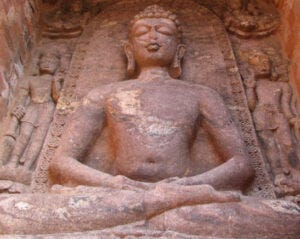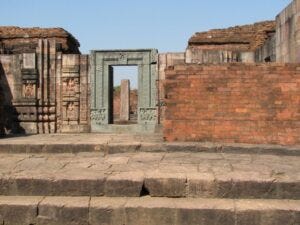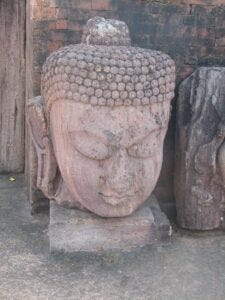The monk or the farmer: Finding purpose in life
A few years ago I was enamoured by Buddhism and the oldest history surrounding the Buddha. There were a few reasons for this:
I don't believe in a God-like figure. Early Buddhism didn't have God-like figures
I was also disillusioned with all forms of organized religion. I also believed (not anymore) that Buddhism was not in this category.
The earliest teachings of the Buddha resonated with me. These teachings just lay out a moral code.
These original teachings don't matter much now to society. This is because organized religion has effectively taken over even in countries where Buddhism is the dominant religion.
As a history buff, I read up a lot on the early teachings of Buddhism. I visited some historic places (pictures I shot at Ratnagiri Mahavihara in Odisha below) as well.
I gave up this deep-dive into Buddhism because my father, during a conversation, made a statement paraphrased below:
The farmer toils in the fields and produces food which sustains everyone, including the monks who practise Buddhism. I'd rather be the farmer than the monk. I would say the farmer who toils like this leads a more noble life than the monk.
When we think of the big questions of life there are two paradigms, we can either dwell (monk-like) on existential questions like "why do we exist?" or we can make ourselves useful (farmer-like) toward some direction like "can I just help everyone have a better existence?" and ignore our need to answer the existential questions.
It is just a choice. Monk or farmer? There is no right or wrong here.
This choice is only for those who are looking for more than 'just existing' which is itself a fair choice. Just getting by is hard enough for most of us much of the time.
The monk
My father's larger point was that any spiritual pursuit is by definition a selfish endeavour. 'Selfish' here is not used in a negative sense. It just means it is for one's own benefit.
It is obviously fine for someone to engage in spirituality if that is what they want to do. There are many who find purpose in this and it helps them immensely.
But if one wants to benefit society in a good way, spirituality is not a high impact way to do it.
It is better for society if more people are spiritual rather than engage in sundry bad behaviour! But that is a second order effect. If helping others is the aim, one should just work on things that directly benefit society.
Many spiritual people or organizations do engage in activities to help society (eg. charity, running schools etc.). But that is not their main purpose. From society's view it will be better if they focussed on these activities full-time!
Moreover, the only way to engage in spirituality is if ones other needs are first met (Maslow's hierarchy of needs) at the standard of living that one sets for oneself.
One could do this living like an ascetic with very few needs or as a member of a luxurious ashram which may require large donations. There is a spectrum here. But the point is one must either rely on others or on one's own previously earned wealth.
These two groups were in fact exactly those who formed the early Buddhist Sangha. The monks who gave up everything and the retired merchants, ruling families etc. who funded and followed it.
The pursuit of the spiritual is a privilege granted by others or by one's own wealth or sacrifice.
The farmer
The other subtext of my father's statement was an open question: can you make yourself more useful (to society)?
I feel that dwelling on the big questions leads to mental toil and not answers. I have, over a long period of time, switched from one paradigm to the other.
A lot of people might be better suited to the "farmer" paradigm but they may just not know that.
As a society, it helps if we encourage people to find ways in which they can impact society in highly positive ways. Think social workers, teachers, scientists, job creators and people in public life who work on solving the big problems of our day.
This type of work can provide a kick for a lot of people and they might just not know that.
You can start at whatever level you can. You can start or fund institutions or innovations. If you have to hold steady employment, you can do that as well although in many cases not at salaries similar to typical corporate jobs.
Maslow's hierarchy will have its say here. The ability to work for the benefit of others is also a privilege.
Looking back, I am happy that my father's words gave me a push in my journey of finding purpose. This was probably one of the last deep conversations I had with him.
I've kept the moral code I saw in Buddhism with me but not much more than that.






